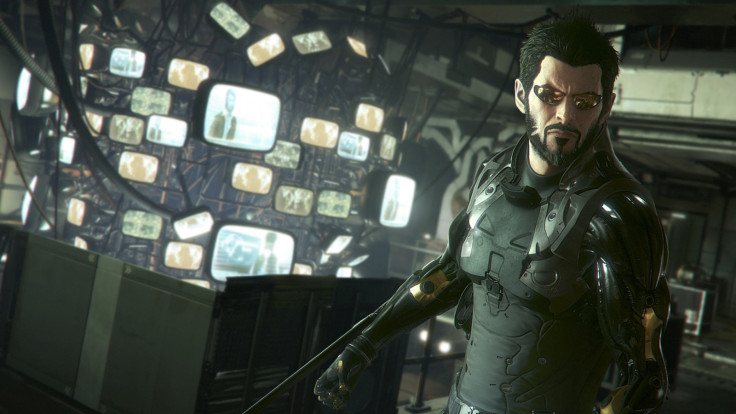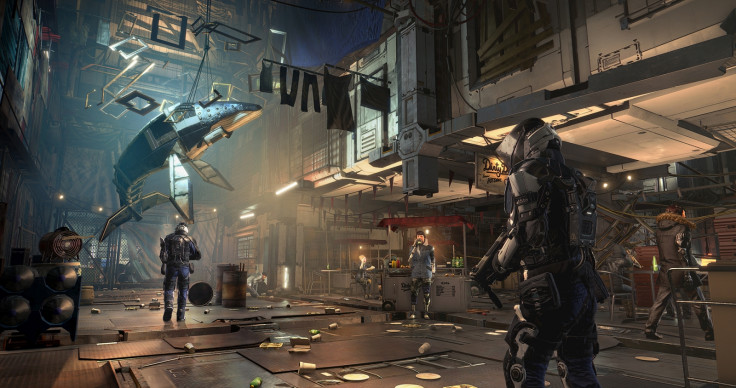Deus Ex: Mankind Divided interview - Eidos Montreal on Adam Jensen, game design and dedicated fans
Producer Oliver Proulx and gameplay director Patrick Fortier discuss their much-anticipated sequel.

Deus Ex is a shooter like few others. It took eleven years for Eidos to develop a worthy successor to the classic original, and it was impressive enough to give the series a new lease on life, leading to a new sequel out this week (23 August).
By now you'll have read our review of Mankind Divided, and if you're a fan you've probably sat down to play the follow-up to 2011's Human Revolution. Having experienced the game, we got talking to the game's producer Oliver Proulx and gameplay director Patrick Fortier about their anticipated sequel.
Strap in, and expect spoilers for the Deus Ex series as a whole.
Mankind Divided begins in protagonist Adam Jensen's apartment, somewhere I found quite interesting. In Deus Ex his broken mirror signified he wasn't happy with who he was, but here he's building a PC, he's fixing watches. Would you say this signifies that he's more content now?
Proulx: One of the things we try to convey is that yeah, he is much more comfortable with who he is, but then you discover things that happened to him. Adam's a rich, tragic character. We wanted to convey a more confident character at the start of the game that slowly succumbs to the world around him.
It definitely feels like he has more agency this time. In Human Revolution what he was doing was reactive, here would you say a lot was driven by Jensen's agency?
Fortier: This is something that Mary wanted and it's something that we worked on continuously. We developed the game as a team effort, we worked together, and sometimes in game design you get caught up in the flow of things, but it's like, wait a second. This has to be true to Jensen and his character.
You have that complication with Miller when you get back from Golem City and he's like, "what do we do, what's going on?". Originally, that conversation was Miller telling you to go there, do this, do that, follow the investigation. It didn't feel right. We reworked it, and it became more like Jensen has already figured it out. He's offering his case and then Miller basically agrees this is the next logical step. He's taking charge, he's taking control and it really changed that scene.
Mechanically, there's a lot of changes across the board, are there any changes you wanted to make that you couldn't or changes that you're very happy with?
Fortier: Generally, I'm very happy. We were working with a lot of different pillars so they only spent so much time on one thing, but you do feel like you made strides and it's more fluid, more satisfying and the combat pillar is on par. It's not a shooter, you can just easily ignore your ammunition, right, but you still get a lot more opportunities for action than in Human Revolution. Fluidity in general, cover system, going from one spot to the next, things like that were really important to us.

Let's talk about the bank a little bit. For many people this was their first real taste of action after the prologue. What were you most happy with regarding that?
Fortier: It's so trimmed down now. Originally it was this maze with more story. It was a really complicated though, and everyone would get lost. We worked at it a lot and we gave it a lot of visual points of reference, like adding the landmarks, the different labels so that you could orient yourself and then just balancing the different paths. It's a really fun environment. I don't know how you played it, but there's also a social path you could use to get access, so you wouldn't even need to use stealth or combat or anything like that. You can talk your way through things and figure out how to do that. It's just really interesting.
I punched everyone in the face.
Proulx: That's one way to do it.
Fortier: I like how that turned out. You can go through the parking lot or the front door. There's just so many options.
You use the bank twice, but both times are optional. Does it worry you to make something so detailed that people could never play?
Fortier: It's scary, sometimes for the team, because a level like the bank, a big chunk of the game, some players might not go through it at all. They might not do the side quest that led you there originally and then there's a story choice that leads you through later. But it's just a choice. You might choose to spend your time doing something else.
Proulx: You also might not see other important sections. The other side of the Bank choice has you seeing Allison when she comes back from the Church. There's a big debate on Allison's standing, a whole conversation. But, you might not see it because you chose something else. That's fine, that's how you played it. That's the beauty of this game, because there's a lot of ways to tackle it and everyone's experiences could be different.
Is it nerve-racking to have such dedicated fans putting your work under the microscope?
Proulx: It is, but the at the same time, just seeing what people are saying about the game is really rewarding after all the effort and passion we put into everything. That's what we worked really hard for.
Fortier: It's really gratifying to see people expressing themselves, doing things creatively that you never considered. The criticism part, that's interesting too, because you want to pay attention to the community, but then again, you want to filter it in a certain way too.
Even within our development team, Deus Ex means very different things to different people. Some people play it a certain way, this is how they expect it to play. Some people on our team go "I don't like that, that's boring" and I'll be like, "whoa, whoa, what are you talking about?" That leads to the same kind of reactions to the fans, things that are important to them, are not important to all. You want to listen to certain things, like boss fights for instance, I mean, that's loud and clear. There are other things where it's our decision, it's our style, it's our vision. Some people don't like the switch between first and third person. We like it. We own it, we embrace it.
That's our vision and, when someone else works on this franchise later on down the line, they will have to do their own thing and figure out their own recipe and their feelings in the same wa. We have no problems living with our creative choices.
Looking back on the entire game, what's the thing you are proudest of?
Proulx: It's a large answer for me, the Prague hub. The art direction, level design, the lighting, there's so many ingredients, so many people worked on it, just that area of the game. Everything had to come together and when it actually started to work, that's just a great moment. I think it's a great achievement, there's so many things to uncover, it's just a fun area to be in.
Fortier: In my case, it's probably the very beginning of the game, the whole scene in the apartment. Something that we came up with near the end of development, the benefit of the extra time that we had to polish properly. With the game we felt we were constraining the player a bit too much. At that point, layers were going in there and kind of ransacking the apartment, and spending time there reading stuff, finding out about the characters from Human Revolution.
Proulx: So Jeff comes to my desk and Mary's like, "Okay, so plot, we have to add a few dialogues, and we have to add a few cinematics, and like, boom, then we're finished."
Fortier: It made it real. I remember, even on the floor, some people were like, "We got some extra time, we're spending it doing shower scenes of Jensen?" I think I was like, nothing that I'm going to say is going to convince you of that, you're going to find out next year, you know, when the game comes out and read reviews and talk to people that played it, then you'll understand why we worked for and have that scene.
Deus Ex: Mankind Divided is out now on PS4, Xbox One and PC.
For all the latest video game news follow us on Twitter @IBTGamesUK
© Copyright IBTimes 2025. All rights reserved.






















